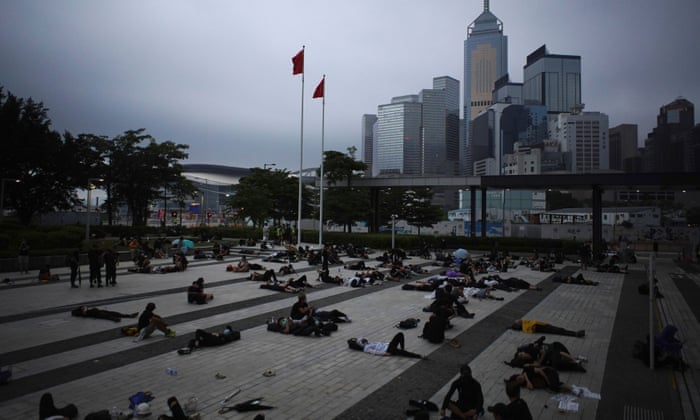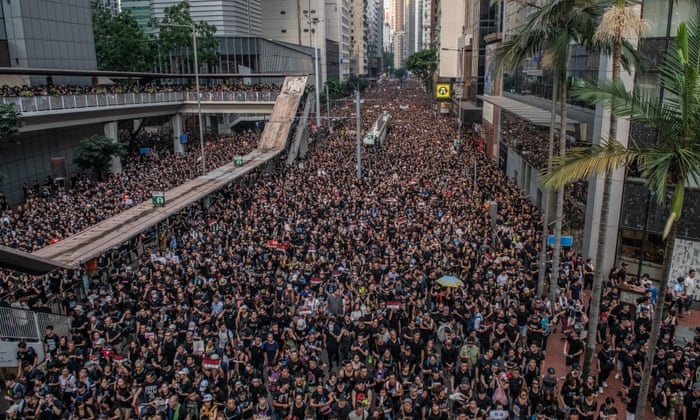Chinese Canadians
"I knew Hong Kong would eventually be handed over to the [Chinese] regime. My friends and I, we feared Hong Kong would be totally under the dictatorial rule."
"The younger generation -- and the people who decided to stay and are now fighting, they have my utmost admiration."
Ivy Li, 63, formerly from Hong Kong, Vancouver resident
Ms. Li was responding to the mass demonstrations in Hong Kong, where people were out on the streets adamant that they would not accept the proposed extradition bill signifying Chinese control over Hong Kong and the erosion of civil liberties in what was once a thriving British colony. Although the Hong Kong government, sympathetic to Chinese rule, announced the bill was suspended, demonstrations continue, demanding it be entirely withdrawn.
 |
| Protesters against a proposed extradition bill, rest near the Legislative Council building in the early morning in Hong Kong Photograph: Athit Perawongmetha/Reuters |
The measure to suspend the bill represents a temporary stop-gap to restore order to the city, according to Carrie Lam, chief executive, who uncharacteristically apologized for the measure to carry the bill to completion having been conducted in an imperious manner. This has failed to satisfy the people of Hong Kong who envision, with good reason, that the extradition law carried to fruition would mark the end of semi-autonomous Hong Kong and the firm entrance of aggressive authoritarian moves from China.
Tens of thousands of people from Hong Kong emigrated to Canada, among them Ms. Li and her family when the United Kingdom agreed to hand control of Hong Kong back to China in 1997. Hong Kong was supposed to retain a high degree of autonomy, with an independent judiciary for 50 years, under the agreement reached between China and the U.K. It is not yet 2047, but the Communist Peoples Republic of China is anxious to reclaim its own, sundering the "One Country, Two Systems" agreement.
Most people immigrating to Canada flooded into Vancouver, on Canada's West Coast. Sparing them from greater Canada's geography where weather extremes can be guaranteed with long, cold, snowy winters and hot and humid summers. On the arrival of people from Hong Kong, the Vancouver real estate market went into overdrive, and property prices soared. Many Chinese from Hong Kong planned to qualify for Canadian citizenship, and then to return to Hong Kong, using their dual citizenship as a lifeboat should it become necessary.
 |
| Several hundred protesters showed up Saturday at the Consulate General of of the People's Republic of China in Vancouver. The protest was a reaction to controversial legislation in Hong Kong that allows extraditions to Mainland China. |
But the Chinese-Canadian population vastly pre-dates these most recent migrations. Chinese people have lived in Canada for over a hundred years. They were brought to Canada to work on constructing Canada's coast-to-coast railways. And they were subjected to dreadful discrimination, among them the notorious 'head tax' in an effort to keep Canada free of non-Caucasians. They were an oppressed minority for generations, working menial jobs, opening laundries and small mom-and-pop stores.
Canada has a huge Chinese population/ mostly from mainland China which long pre-dated the Hong Kong diaspora, however, with large demographics in Toronto and Ottawa; in total close to two million people of Chinese descent enriching the Canadian culture. Now, it is anticipated given the unrest and fear circulating in Hong Kong that emigration from the country will once again pick up.
 |
| Vancouver's Chinatown is one of the oldest neighbourhoods in the city and a nationally-recognized historic site. (Photo by: Judy Lam Maxwell) |
"I would assume more parents would want their children educated abroad, particularly pursuing North American education, possibly as a path of immigration"Mr. Tao is anticipating a potential surge in immigration from Hong Kong. He has received overtures from clients who had lived in Canada, as children or as parents of children who had returned to Hong Kong in the last two decades and now consider a return to Canada. Many of these people already hold Canadian citizenship. And there will be many more, he hazards to conjecture, that will want to join them, escaping what they fear will be the inevitable takeover of Hong Kong by China.
"The political environment, the abundance of home-owning opportunities, or the well-being of their children and reuniting the family here, are all factors in that process."
Will Tao, Vancouver immigration lawyer
 |
| Protesters demonstrate against the now-suspended extradition bill on 16 June in Hong Kong Photograph: Carl Court/Getty Images |
Labels: Canada, China, Hong Kong, Immigration, Protests, Vancouver
0 Comments:
Post a Comment
<< Home